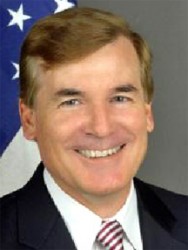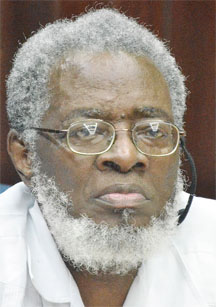The United States is standing by its position that a democracy project here should go ahead despite the government’s opposition, the most serious diplomatic stand-off between the two countries since the PPP/C took office in 1992 on a wave of western support for free and fair elections.
The US position on the $300m Leadership and Democracy (LEAD) project was conveyed to the Government of Guyana in response to a Note Verbale from Georgetown requesting clarification on an interview granted to Stabroek News by US Ambassador Brent Hardt in which he said the project would proceed.
“We did get a response last Friday…basically repeating what they had said before,” a source close to the government told Stabroek News yesterday.

The source said that Head of the Presidential Secretariat Dr. Roger Luncheon, who has been the government’s lead spokesperson on this matter, will be dealing with the issue at his post-Cabinet press conference today. Diplomatic observers say the government will no doubt have to weigh how it responds to Washington’s latest position.
It was Luncheon who on November 26th last announced that government had rejected the project, which, among other goals, aims to boost citizens’ engagement with local parliamentarians and improve overall governance.
He had argued that his government had no input, saying any notion of consultation was really “just cosmetic.”

The ruling PPP also expressed concern, saying it believed the project was implemented in collusion with the opposition to hasten its exit from office. “There is deep suspicion in political circles that this particular project was conceived to bolster the political fortunes of the opposition political parties in Guyana. Small wonder why the political opposition and sections of the media are enamored with the project and have gobbled it up with hunger and satisfaction,” a statement from the party read.
“After all, the money tree has now sprung up in the opposition camp to fund trips to the interior of our country, and radio and TV time, in short, to provide funding for activities of the opposition political parties so that they may have some political advantage over the PPP. From all indications it appears that we have turned full circle to the extent that we have returned to the days of the mid 1960s when the AFLCIO funded opposition trade unions and political parties to destabilize the Jagan-led PPP government during the 1962-1964 period,” it went on to state.
Luncheon has severely criticised the United States Ambassador, accusing him of challenging Guyana’s sovereignty after the ambassador said in the Stabroek News interview that the project would go ahead.
The US Ambassador had told this newspaper that there was no truth in the claim that the administration had not been consulted and the US Embassy released a series of correspondence showing that from the start the administration was actively engaged on the project. Luncheon had even thanked the embassy for its “diligent” efforts to inform government.
The government then dispatched a diplomatic note to the US State Department and challenged the US Ambassador to prove that USAID has a right to go ahead with the project here despite government’s objections on grounds of a lack of consultation. It said Hardt violated ambassadorial duties by pushing ahead although given a red light by government.
However, diplomatic observers say that the US Ambassador would not have announced the continuation of the project without Washington’s go ahead.
Opposition figures and non-government groups have accused the government of contriving the charge of a violation of sovereignty in relation to the US project. They have argued that the project would be helpful considering that local government elections have not been held here since 1994. They have also pointed out that when it was in the opposition prior to the 1992 general elections, the PPP invited US intervention in many electoral areas without seeing it as a violation of sovereignty.
Washington recently took a hardline position on Ecuador. It cancelled aid to Ecuador worth US$32 million over the coming years after long-running disputes with the government of President Rafael Correa.
According to a US State Department spokesperson, Ecuador recently informed the US Agency for International Development (USAID) it could not undertake new activities or extend existing ones without an accord governing bilateral assistance. This led to the US decision to cancel the aid.
“Our planned US$32 million in assistance programs for the coming years would have allowed us to partner with Ecuadoreans to achieve their own development goals in critical areas,” said a letter dated December 12 from USAID to Ecuador, according to Reuters.
A spokesperson for the US Embassy in Quito said two years of negotiations failed to reach a new agreement.









